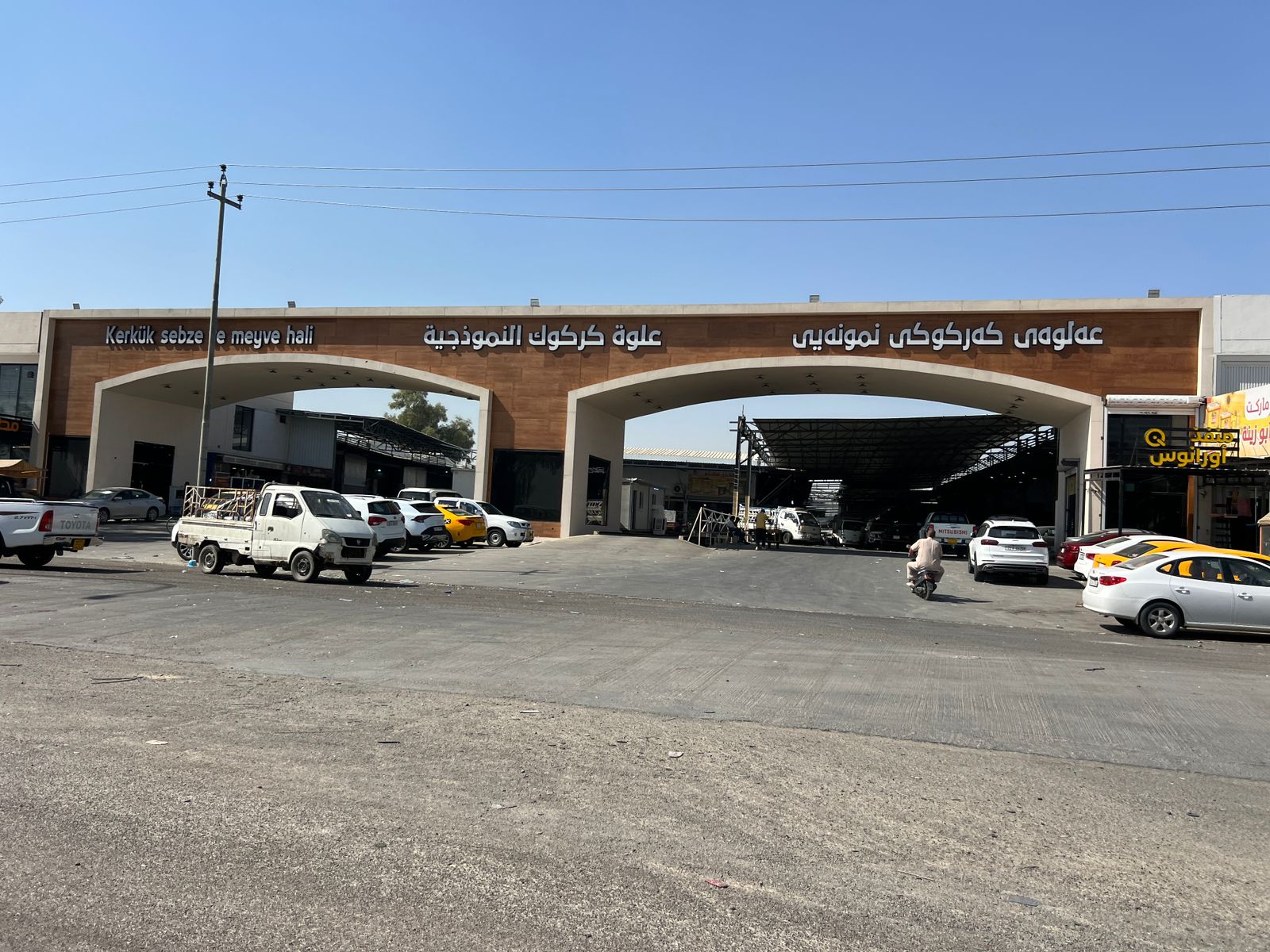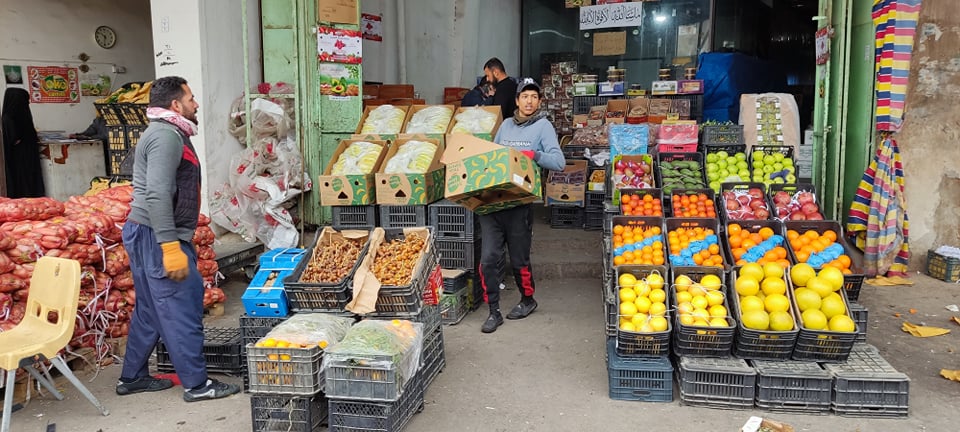The people of Kirkuk pay about 50 Iraqi dinars IQD or more for each kilogram of fruits and vegetables without their knowledge, due to an understanding between the shopkeepers of the Kirkuk modern greengrocery warehouse and the contractor who built the complex.
The issue has been brought to the attention of the governor and the provincial council is aware, but it is unclear what their steps will be, because the contractor says his project "will return 700 to 800 million dinars annually to the government.”
Younis Mohammed, a grocer for 27 years, said they are forced to pay 1,000 IQD (USD0,70) for each bags/boxes of fruit and vegetables.
"In general, each grocer is forced to pay between 15,000 and 30,000 dinars daily," Mohammed said.
The Kirkuk typical warehouse market has been opened for nearly a year and was built by a contractor who has an agreement with the Kirkuk local administration and municipality.
"We do not charge shopkeepers and grocers, we only charge wholesalers who have warehouses in the bazaar," the warehouse administration officials told a news conference.
“At first they decided to charge 1,000 dinars for each five pieces, then they made it three pieces and 1,000 dinars,” Mohammed added.
“The warehouse owners should have paid the contractor instead of receiving warehouses in the Kirkuk typical warehouse, but now the warehouse owners are not paying, so the contractor met with the warehouse owners and told them that if they do not pay he will charge greengrocers and increase it from five pieces to three pieces for 1,000 dinars.”
The warehouse owners had to pay the contractor instead of receiving warehouses in the Kirkuk typical warehouse
According to the grocers, the warehouse owners have agreed among themselves, so that 110 warehouse owners have signed not to pay themselves and in exchange for increased piece fees on the buying grocers.
“I am one of the grocers who pay 15,000 dinars daily. Some grocers pay 30,000, so others pay 750,000 dinars monthly,” Mohammed said.
Back in 2022, the owners of vegetable shops in the Khan Khurma greengrocery wholesale decided to permanently close their stores due to the imposition of "illegal" taxes, as they described it, but they decided to open their shops a day later, provided that the decision to impose taxes is reconsidered.
The amount of tax fees collected by an investor from the sellers of Khan Khurma wholesale with the approval of the municipality, was ranging from 250 to 500 Iraqi dinars per bag or box, depending on the size.
The tax was collected by security elements belonging to the investor who are present at the entrances and exits of the market, in return for regulating and protecting the market in terms of security.

Kirkuk typical Warehouse, Kirkuk, October 2024. Rebaz Hassan
In general, according to the estimates of the grocers for each kilogram of fruits and vegetables, the amount of 50 IQD or more is paid by the consumers, because the grocers are forced to compensate for their expenses, obligd to sell fruits and vegetables at higher prices.
“This amount is huge, it has a huge impact on the expensiveness of the market and reducing our income.”
KirkukNow had tried to get the comment of the administration and finances of the Kirkuk typical warehouse for at least a week, but they refused to comment on the issue, saying that the issue has now cooled down and “everyone has accepted it”.
Hoshmand Wali, financial director of the Kirkuk typical warehouse, told the media earlier, "We have done a great service to the city by opening this project, annually return 700 to 800 million dinars to the government," but did not explain how and where Which government will go.
The oil rich-city of Kirkuk, located 238 kilometers north of Baghdad, is an ethnically mixed province for 1.7 million Kurds, Sunni and Shiite Arabs, and Turkmen. It has long been at the center of disputed territories between Baghdad and Erbil.
By opening this project, we will return 700 to 800 million dinars annually to the government
Rebwar Taha, the Governor of Kirkuk, met with shopkeepers and traders earlier last month and promised to solve the problem.
"The owners of the warehouses refused to pay the contractor and as a result, the warehouse owners and the contractor agreed to receive 1,000 dinars for each piece of groceries," Wali said.
According to the agreement, the contractor will forgive the amount of money that the warehouse owners had to pay, which is about $ 3 million; they agreed the greengrocers to be charged one thousand dinars for three pieces instead of five,” Wali added.
He believes the amount is not so big to affect the lives of grocers and the market.
“I earn 20,000 to 25,000 dinars daily until evening, but I pay 15,000 dinars daily at the warehouse door, which is about 400,000 dinars a month,” said Farhad Ali, a grocer.
Ahmad Kirkuki, a member of the Kirkuk governor's council, told Kirkuk Now that any amount of money increased outside the contract is illegal.
If any amount is increased outside the contract on the traders
“I will visit the warehouse this week to investigate the shortcomings.”
Younis Mohammed asked how they saw the decision. "It is illegal because the contract between the warehouse owners and the contractor was to charge only 1,000 for every five pieces, but the warehouse owners have agreed to charge more money for the contractor," he said.
The grocers pay 250 dinars for each piece to the warehouse owners under the name of carrying rights, but it is unclear where the money goes.
Previously, the Kirkuk Greengrocery Wolesale was located in Khan Dates market. After much effort and pressure, the shopkeepers were forced to move to the Kirkuk typical warehouse and Khan Dates was closed.
Sherzad Ahmad, another grocer in Kirkuk, said they intend to charge more money from grocers in the New Year, so that each piece will be 500 dinars, but no other grocer confirmed this.
*This story has been produced as part of the 'Budget is Your Right' initiative, with support from the National Democratic Institute (NDI).





